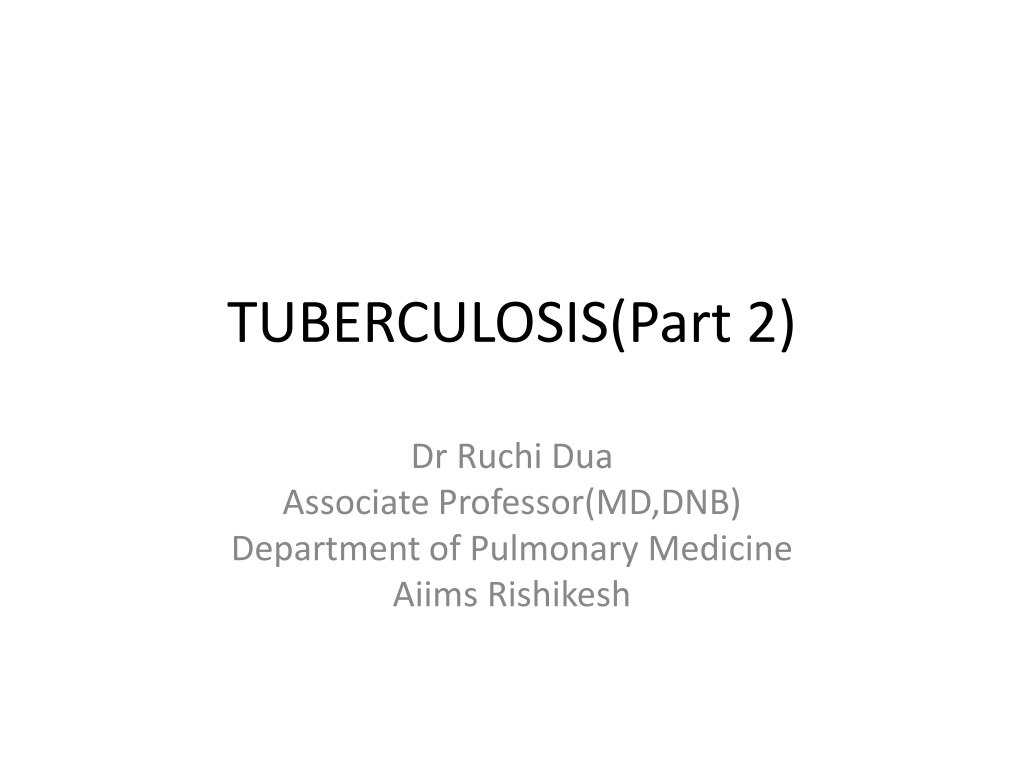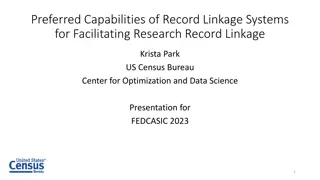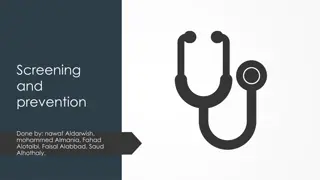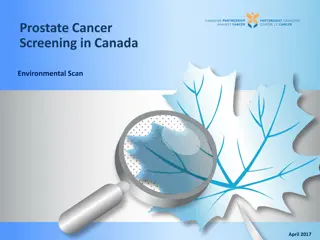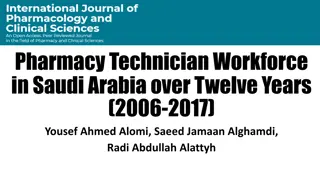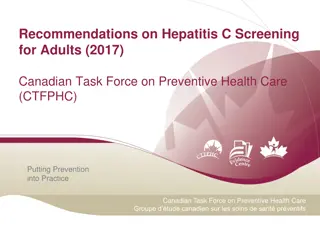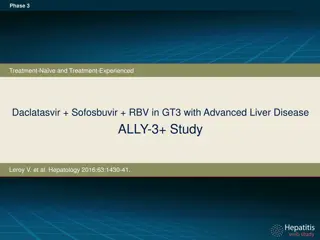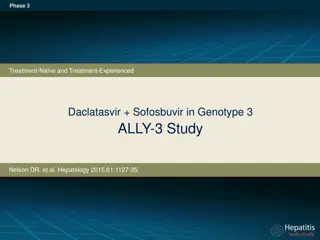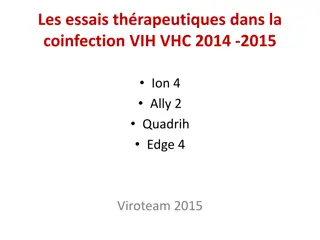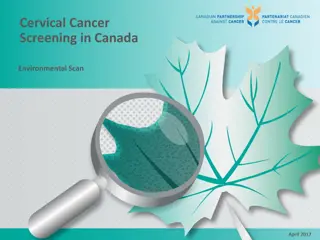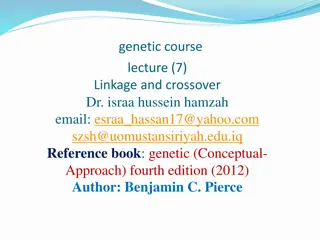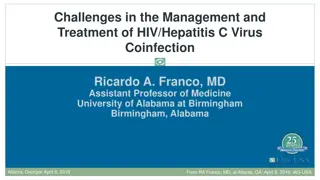HCV Screening and Linkage to Care Program in a Pharmacy Setting
Chronic HCV infection can lead to severe liver complications and affect various body systems beyond the liver. It is crucial to identify patients with HCV, convey the urgency of testing, and provide appropriate care to prevent long-term consequences. Screening programs in pharmacy settings play a vital role in early detection and linkage to care for individuals at risk.
Download Presentation

Please find below an Image/Link to download the presentation.
The content on the website is provided AS IS for your information and personal use only. It may not be sold, licensed, or shared on other websites without obtaining consent from the author. Download presentation by click this link. If you encounter any issues during the download, it is possible that the publisher has removed the file from their server.
E N D
Presentation Transcript
TUBERCULOSIS(Part 2) Dr Ruchi Dua Associate Professor(MD,DNB) Department of Pulmonary Medicine Aiims Rishikesh
SITES Virtually anywhere Lungs Pleura Lymph node
PULMONARY PULMONARY- CLINICAL SCENARIO
SYMPTOMS(Pulmonary) Cough+ exp (>2 weeks) Fever Appetite/weight loss Chest pain Haemoptysis Dyspnea
SIGNS General Emaciated Anaemic Clubbing Cyanosis LN Edema
PRESENTATION(signs) Respiratory consolidation fibro-cavitatory disease Collapse Effusions Pneumothorax hydro-pneumothorax Wide variety of clinical findings
LN TB LN-site painless enlargement ,systemic symptoms<50% Matting Sinus/fistula FNAC/Bx/NAAT/smear/culture
SKELETAL TB Site Pain/joint swelling/dec range of motion. Draining sinuses and abscesses Systemic symptoms Radiographic changes m/b nonspecific
CNS TB Tuberculous meningitis(MC), intracranial tuberculomas, , cranial nerve palsies and communicating hydrocephalus , cranial vasculitis may lead to focal neurologic deficits. Malaise, headache, fever, or personality change,A/S,seizures/focal defects CSF lymphocytic,increased protein,ADA,CB NAAT
Kochs abdomen Site-gut/peritoneum/LN pain,nausea/vomitting altered bowel habbits Distension Diagnosis:ascetic fluid analysis/LN sampling/radiology
Miliary Fever/dec appetite/wt loss/vague-elderly Haematogenous Fulminant disease -septic shock, ARDS,MOF CXR/Liver/spleen BX/BM Haematological-anaemia(NCNC),hyponatremia
PRESENTATION(Extra-Pulmonary) Genitourinary-infertility, urinary difficulties CVS-pericarditis(pain/dyspnea)
CLINICAL CLUES-EPTB Ascites -lymphocyte predominance and negative bacterial cultures Chronic lymphadenopathy (especially cervical) CSF -lymphocytic pleocytosis / elevated protein /low glucose Pleural effusion -Exudative / lymphocyte predominance/negative bacterial cultures Joint inflammation (monoarticular) with negative bacterial cultures Persistent sterile pyuria Unexplained pericardial effusion, constrictive pericarditis, or pericardial calcification/Vertebral osteomyelitis involving the thoracic spine
COMPLICATIONS Local- ARDS/respiratory failure Bronchiectasis/PTOAD aspergilloma haemoptysis (symp ) Pleural -Empyema/pneumo Extensive lung destruction Rt middle lobe syndrome Scar ca
Systemic- shock amyloidosis disseminated tb-(laryngeal tb) Cor-pulmonale
INVESTIGATIONS Active infection Latent Infection Drug resistance
ACTIVE TUBERCULOSIS Radiology-X-ray Microbiological-smear /culture NAAT-gene expert
CXR Abnormalities often seen in apical or posterior segments of upper lobe or superior segments of lower lobe May have unusual appearance in HIV-positive persons Cannot confirm diagnosis of TB!! Sensitive,specificity is low
No chest X-ray pattern is absolutely typical of TB 10-15% of culture-positive TB patients not diagnosed by X-ray 40% of patients diagnosed as having TB on the basis of x-ray alone do not have active TB
Proportion of patients with pulmonary TB who have positive AFB smears 98% 98% 100 100 80 80 60 60 50% 50% 40 40 20 20 0 0 AFB Microscopy X-ray
SPUTUM SMEAR Rapid , results within hours Inexpensive simple, relatively easy to perform Reliable(40-64%sensitive,90%specificity)
CULTURE Gold standard for TB diagnosis(100 bacilli) Culture all specimens, even if smear negative Conventional(LJ-6-8wks) Rapid liquid culture-Bactec/MGIT Allows DST Vs smear
IMMUNOLOGICAL TESTS BANNED Antigen/antibody detection method(ELISA ) Not specific, rapid, expensive Cannot differentiate active/past infection.
WHAT is LTBI? 1.PPD- infection with M tuberculosis produces a Delayed Type Hypersensitivity (DTH) to certain antigenic components 2.Interferon gamma release assays Quantiferon gold/Elispot test single patient visit assesses responses to multiple antigens does not boost anamnestic immune responses Less reader bias/reading moderate concordance between TST and QFT
Limitations Active Vs inactive disease Old Vs new BCG /MOTT(though IGRA are less affected)
DRUG RESISTANCE Conventional/rapid culture & DST GOLD standard NAAT-gene xpert LPA
Principles of chemotherapy Variable bacilli population:rapid growers,slow growers,dormant Longer duration 2 phases of treatment Need for multiple drugs to treat(spontaneous resistance)
